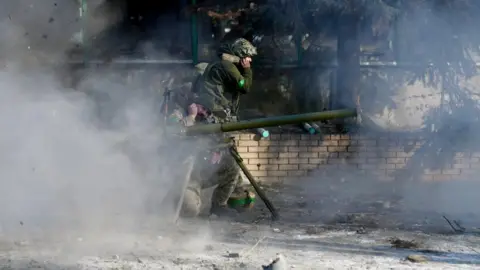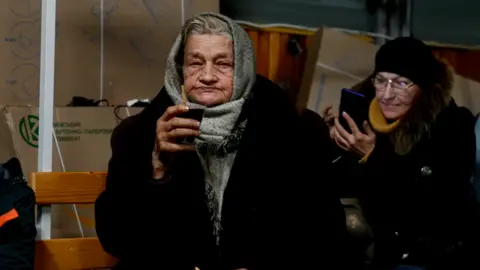Ukraine war: Russians slowly take ground around Bakhmut
 BBC/Goktay Koraltan
BBC/Goktay Koraltan"Stay close to the wall. Move fast. Single file. Just a few at a time."
The staccato instructions come from the Ukrainian army escort taking us to a military position in battle-scarred Bakhmut, a city once famed for its sparkling wines.
Ukraine's President Volodymyr Zelensky has called the eastern city "our fortress". Russian forces have spent the past six months trying to capture Bakhmut. Now they have intensified their onslaught - Ukraine believes - to tear it down ahead of the anniversary of the invasion.
We follow orders, darting down an icy rubble-strewn street, with a clear blue sky overhead - ideal for Russian drones.
Just after we cross the road, two Russian shells come slamming down behind us on the other side. We turn around to see black smoke rising and keep on running.
Was the shelling random or aimed at us? We can't be sure, but everything that moves in Bakhmut is a target - soldier or civilian.
For hours there is no let-up in the shelling, incoming and outgoing. A Russian fighter jet roars overhead. The nearest Russian troops are just two kilometres away.
There is street fighting in some areas, but Ukrainian forces still hold the city - despite sub-zero temperatures and dwindling ammunition.
"We have some shortages of ammunition of all kinds, especially artillery rounds," says Capt Mykhailo from the 93rd Mechanised Brigade, whose call sign is 'Polyglot'. "We also need encrypted communication devices from our Western allies, and some armoured personnel carriers to move troops around. But we still manage. One of the main lessons of this war is how to fight with limited resources."
We get an insight into the ammunition problems as Ukrainian troops target a Russian position with 60mm mortars. The first mortar round flies from the tube with a loud bang. The second round doesn't eject.
There's a hiss of smoke and a shout of "misfire" sending the mortar unit scrambling for cover. Troops tell us the ammunition is old stock, sent from abroad.
The battle for Bakhmut is a war within a war. Some of the fiercest fighting of the invasion has happened here. And now the Kremlin's forces are gaining ground, metre by metre, body by body. Wave after wave of mercenaries from the notorious Wagner group have been sent into battle here. There are reports of fields of Russian corpses.
Moscow now has effective control of both main roads into the city, leaving just one back route left - a slender supply line.
"They have been trying to take the city since July," says Iryna, press officer of the 93rd Brigade. "Little by little they are winning now. They have more resources, so if they play the long game they will win. I can't say how long it will take.
"Maybe they will run out of resources. I really hope so."
We move from carefully concealed firing positions to bunkers humming with generators and warmed by stoves. But troops take care to conceal any smoke which could give away their location - part of the housekeeping of war. Among those we meet there is calm determination to fight on.
"They are trying to encircle us so that we leave the city, but it's not working," says Ihor, a camouflage-clad commander, with a battle-hardened edge. "The city is under control. Transport moves, despite constant artillery strikes. Of course, we have losses from our side, but we are holding on. We only have one option - to keep going to victory."
There is another option - to withdraw from Bakhmut before it's too late. But among the defenders on the ground there seems little appetite for that. "If we have such an order from our HQ, OK, order is order," says Captain Myhailo. "But what sense to hold all these months if you need to retreat from this city? No, we don't want to do this."
He recalls those who have given their lives for Bakhmut - "a lot of good brave men who just love this country."
And if the defenders of Bakhmut were to withdraw, it would pave the way for Russia to push towards bigger cities in eastern Ukraine like Kramatorsk and Slovyansk.
Moscow has stepped up its attacks in other front-line areas in the Donbas region in the east, and in the south. Ukrainian officials say a new Russian offensive is already under way.
The Kremlin is on a clock, as it counts down to the anniversary on 24 February. "They are mad about dates and so-called 'victory days'," says Capt Mykhailo.
But the battle of attrition for Bakhmut could wear out the Russians, according to Viktor, a tall, lean Ukrainian commander who has captured Russian magazines on a shelf in his bunker.
"They don't defend now," he says, "they just attack. They continue taking some metres, but we are trying to make sure they take as little of our land as possible. We are holding the enemy here and wearing them out."
Perhaps.
There is still some life in Bakhmut if you know where to find it.
A blast of heat and light hits you when you walk through the door of the "invincibility hub", past boxes of donated food supplies. It's a boxing club turned life-support system where local people can recharge their phones and themselves, with hot food and companionship.
 BBC/Goktay Koraltan
BBC/Goktay KoraltanIt was crowded when we visited, with elderly women clustered around a stove, and two young boys sitting in the boxing ring, glued to a TV screen, and playing war games.
Around 5,000 civilians remain in Bakhmut without running water or power - many are elderly and poor. "Some are pro-Moscow. They are waiting for the Russians," a Ukrainian colleague mutters darkly.
All here are fighting their own battles says Tetiana, a 23-year-old psychologist who is at the hub watching over her young brother and sister. She's still in Bakhmut because her 86-year-old grandmother can't move and relies on her.
"Most people deal with it by praying to God," she says. "Faith helps. Some forget that they are people. Some show aggression. They start behaving worse than animals."
Back outside the battle for this broken city rages on, with a drum beat of shelling as we leave.


Almost one year on since the start of the conflict, what questions do you have about the war in Ukraine?
In some cases your question will be published, displaying your name, age and location as you provide it, unless you state otherwise. Your contact details will never be published. Please ensure you have read our terms & conditions and privacy policy.
Use this form to ask your question:
If you are reading this page and can't see the form you will need to visit the mobile version of the BBC website to submit your question or send them via email to [email protected]. Please include your name, age and location with any question you send in.
